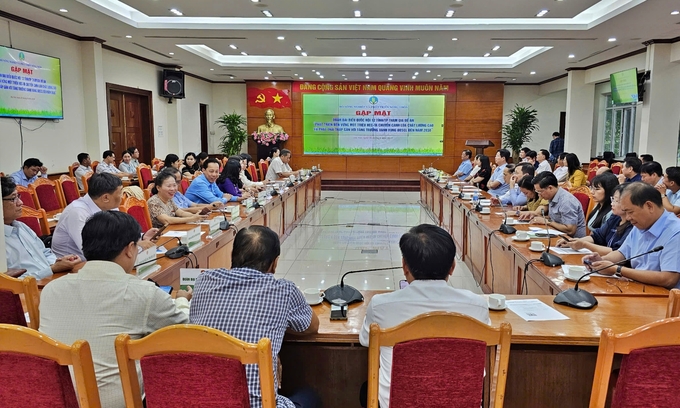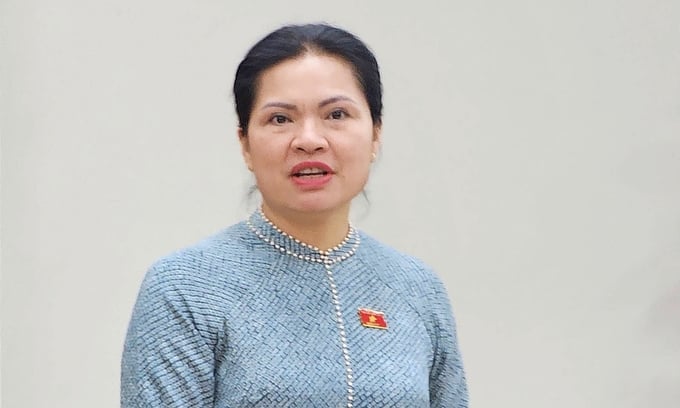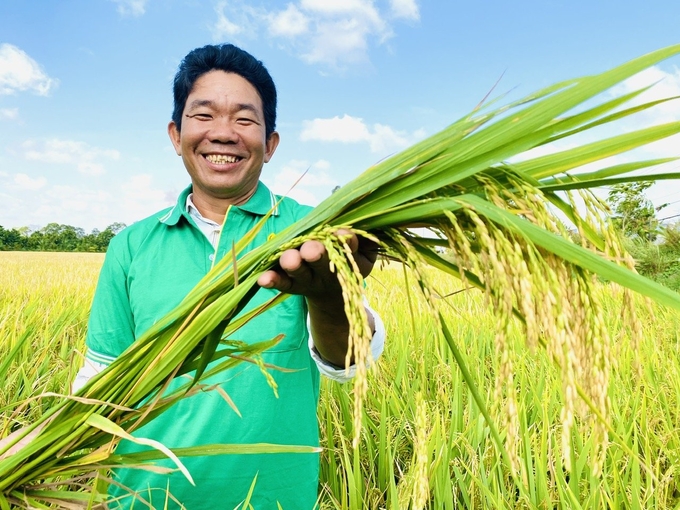November 27, 2025 | 17:13 GMT +7
November 27, 2025 | 17:13 GMT +7
Hotline: 0913.378.918
November 27, 2025 | 17:13 GMT +7
Hotline: 0913.378.918

The Ministry of Agriculture and Rural Development works with the National Assembly delegation of 12 provinces and cities in the Mekong Delta. Photo: Bao Thang.
On the afternoon of August 26, the Ministry of Agriculture and Rural Development met with the National Assembly delegations of 12 provinces and cities in the project area "Sustainable development of 1 million hectares of high-quality and low-emission rice cultivation associated with green growth in the Mekong Delta (MD) by 2030".
Introducing the project, the Director of the Department of International Cooperation (MARD), Nguyen Do Anh Tuan, said that 1 million hectares of high-quality rice is a revolution in rice production. The project will implement many synchronous tasks, including infrastructure, farming methods, and mechanization. In addition, it is also about reorganizing production and strengthening links between people, cooperatives, businesses, and traders to reduce risks in prices and markets.
Currently, the Ministry of Agriculture and Rural Development is coordinating with relevant agencies to build 7 pilot models of the project in 5 provinces. Based on the experience gained, the Ministry will issue a handbook specifying the technical advances that must be applied.
The Vietnam Rice Industry Association was established at the end of 2023 for more synchronous implementation. According to Mr. Tuan, the goal is to call for the active participation of state agencies, farmers' associations, enterprises, cooperatives, etc., to promote the chain of linkages.

Minister Le Minh Hoan: "Implementing the 1 million hectare rice project is an opportunity to restructure the rice industry." Photo: Bao Thang.
Before the National Assembly Delegation of 12 provinces and cities, Mr. Nguyen Do Anh Tuan pointed out that the most significant difficulty of the project was calling for capital for implementation, about USD 3 billion. This figure will be spent on infrastructure and irrigation, improving skills and technical support for localities. It is expected that 60% will be socialized capital, and the remaining USD 1.2 billion will be mobilized from international organizations such as the World Bank, ADB, etc.
With a huge investment (USD 3 billion), the head of the Department of International Cooperation reminded the locality to add the aspect of capital recovery and interest payment. However, according to estimates, the project will create new value equivalent to about VND 21,000 billion per year, equivalent to about USD 840 million per year.
This figure includes a 20% cost reduction (VND 9,500 billion), an increase in the selling price of finished products of about 10% (VND 7,000 billion), a cost reduction of 5 tons of CO2 emissions per hectare (about VND 2,500 billion), and the utilization of waste and by-products (VND 2,000 billion). People's income is forecast to increase by 40%, while 1 million jobs for farmers in the project area are guaranteed, contributing to building Vietnam's image internationally.

Mrs. Ha Thi Nga, President of Vietnam Women's Union. Photo: Bao Thang.
Mr. Thach Phuoc Binh, Deputy Head of the National Assembly Delegation of Tra Vinh province, expressed concern that the 1 million hectares of high-quality rice project has not mentioned the irrigation infrastructure and warehouses. In addition, the Ministry of Agriculture and Rural Development needs to clarify the coordination mechanism between the Central Government and localities and between localities. The differences between localities in the project area also need to be considered.
Some other delegates said that, besides determining the entire political system, the project must change people's awareness. The underlying reason is that farming has not yet met the income and employment needs of most of the population. Assessments of risks, economic benefits, and the project's sustainability must also be discussed in more detail.
Minister of Agriculture and Rural Development Le Minh Hoan pointed out that the goal of 1 million hectares of high-quality rice is not limited to the economic category. Through practical activities, the project hopes to restructure the ecosystem of the entire industry, including people's farming methods, the trader system, and cooperative organizations. Reducing emissions associated with green growth is just one of the goals.

Many issues regarding the 1 million-hectare rice project have interested National Assembly delegates. Photo: Le Hoang Vu.
Agreeing with the opinion of Director Nguyen Do Anh Tuan, Minister Le Minh Hoan admitted that the project will be entangled in many laws when implemented. Wanting to implement it quickly and promptly, as committed to the sponsors, the commander of the agricultural sector left open the possibility that the issue could be discussed at the National Assembly to remove institutional bottlenecks, thereby creating a special mechanism, especially regarding capital disbursement.
"1 million hectares of high-quality rice is not the path we are still taking. If localities do not consider this a revolution, it cannot be successful. The Ministry of Agriculture and Rural Development cannot reach out to each farmer, convincing them to change their thinking and farming practices," the Minister expressed.
The Minister called on National Assembly delegates to participate in the meeting to spread and convey the project's spirit to the people. From there, the operating mechanism of the rice industry will be rebuilt, with farmers at the center.
Mrs. Ha Thi Nga, President of the Vietnam Women's Union, National Assembly Delegation of Dong Thap province, hopes that the 1 million hectares of high-quality rice project will help attract young workers to return to their homeland, help them stabilize their lives in their land, and at the same time support farmers in the Mekong Delta to maximize the advantages and potential of this fertile land.
Translated by Huong Giang

(VAN) According to Mr. Vo Minh Thanh, Director of the Tay Ninh Department of Agriculture and Environment, Resolution 57 has created a new development pathway for the locality, shifting from traditional toward modern agriculture.
/2025/11/26/4909-2-154329_878.jpg)
(VAN) Pearl grouper farming in HDPE cages not only delivers economic efficiency but also contributes to protecting the environment, creating jobs, and promoting marine-based experiential tourism.

(VAN) The model of making a living under the forest canopy through the agroforestry system in Van Son commune, Bac Ninh province, is expected to generate an annual income of approximately VND 30 million/ha.

(VAN) Many enterprises in Can Tho are harnessing natural energy and reducing greenhouse gas emissions in their production processes, thereby contributing to the promotion of a sustainable green transition.
/2025/11/24/3536-2-112800_176.jpg)
(VAN) Dong Nai now has tens of thousands of hectares of forests certified for sustainable management, and this area will continue to be expanded in the coming period.

(VAN) Vinh Ha hamlet (Dai Xuyen commune, Hanoi) is shifting away from small-scale farming as households adopt bioscurity into their breeder chicken models.

(VAN) Heavy rains make aquatic species more vulnerable to disease. Proactive water management and high-tech systems help farmers prevent outbreaks and protect yields.